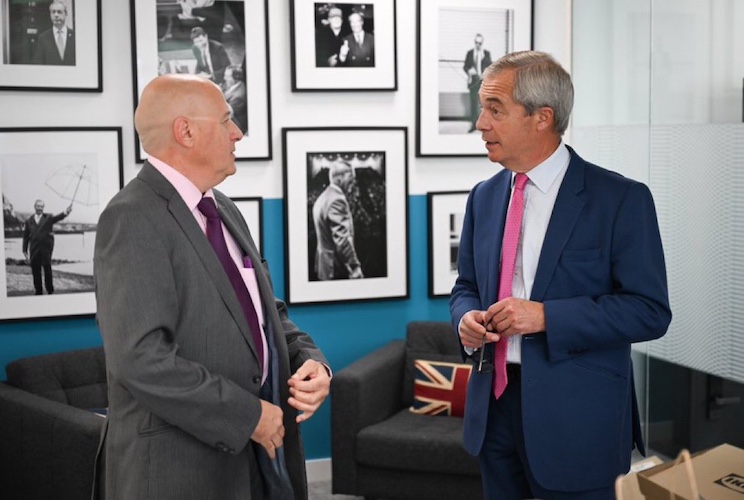He was arguably not the most Farageist of the group, but Keith Prince always looked one of the more likely of the London Assembly Conservatives to throw in their lot with Reform UK.
He was clearly on the right wing of the party: early last year, for example, he thought it a good idea to book celebrity lout Lee Anderson as star guest at a “gala dinner” on a date that turned out to be inconveniently adjacent to Anderson’s gutter lie that Islamists had “got control” of Sir Sadiq Khan. Anderson defected to Reform soon after. Now, Prince can again be an Anderson fan without having to hide it.
His local political landscape will have influenced his calculations. As well as representing Havering & Redbridge on the assembly, Prince is a councillor in Havering, which has a unique electoral microclimate.
In the May 2022 borough elections, the Conservatives finished second best to a large group of Residents’ Association candidates, one of whom has since then been the council’s leader. Some of those who backed these hyperlocal non-politicians, who have long been a part of the Havering scene, might well like the look of Reform. Maybe some of their representatives do too.
Faragesim has made more inroads in Havering in the past than in any other London borough: in the 2014 borough contests, his UK Independence Party won seven seats. After Bexley, it is perhaps the borough most likely to be won by Reform next year. And last year, a local MP, Julia Lopez, only just held off a Reform challenge. Another, Romford’s flag-waving Andrew Rosindell, survived a 30 per cent vote share drop, as Reform’s candidate took 22 per cent.
In January, Prince stepped down as Havering Tory group leader, reportedly citing “changes in his personal and professional circumstances” for his decision. It seems he thinks he’s seen the writing on the Tory wall – a siren scrawl that says “the future of the Right is Reform”.
Which London Conservatives might follow Prince? It isn’t hard to imagine fellow Havering – and maybe fellow Redbridge – Tories doing so. As for the London Assembly group, it contains two conspicuous Trump Tories in its leader, the perma-catastrophist Susan Hall, and her ally Alessandro Georgiou, who also leads the Conservatives on Labour-run Enfield Council.
In her social media output, as charmless as it is copious, Hall routinely allies herself with figures even further to the Right than Farage, such as “remigration” advocate Rupert Lowe MP and an ethnonationalist, self-styled “free speech” martyr who lately described the far-Right so-called Tommy Robinson, a man with a considerable criminal record, as a “national treasure”.
Hall is, though, seen as a diehard party loyalist. It would be quite a leap for her to forsake Tory leader Kemi Badenoch, who she succeeded on the assembly in 2017 after Badenoch became an MP, and has described as a mentor.
As for Georgiou, any urge he might have to follow Prince by jumping on the Reform bandwagon – which he’d fit into just as well as Prince or Hall – might be tempered by his own local ambitions. In 2022, against the London trend, the Tories closed the gap on Labour in Enfield, and in a recent exchange of unpleasantries on X/Twitter with current leader Ergin Erbil, Georgiou underlined his appetite for displacing him.
Giorgiou, like Prince, seems to have identified a danger to his prospects from Reform: following last month’s United The Kingdom march, led by Robinson, he recorded a video address in which he declared himself deeply moved by the sight of so many “Brits” processing through central London, attempting, somewhat ambitiously, to portray an almost wholly white gathering as multicultural; after the government’s New Towns taskforce confirmed that it had recommended Green Belt land in Enfield as a site for 21,000 homes, he went Full Winston in his indignation.
But such performances seem designed to dissuade Enfield voters who’ve previously backed local Tories from peeling off to Reform – thereby splitting the Right vote and potentially thwarting Georgiou’s quest – rather than a sign that Georgiou thinks his chances would be improved by changing sides. After all, Enfield doesn’t have the same history of Farage-friendliness as Havering.
All this switching and Rule, Britannia positioning is taking place as the Conservatives gather in Manchester for their annual conference. Few are in an upbeat mood. In a despairing LinkedIn post, Kevin Davies, who led Kingston Council from 2014 to 2018, has likened attending to travelling to a funeral. “This is the first time I have gone to a conference not understanding what the point is,” he writes.
Davies has intimate experienced of the Tory decline in London. At the end of his four years in charge there, during which the EU referendum took place, his party was routed in Kingston by the Liberal Democrats, losing 19 seats to be reduced to an opposition group of nine. In 2022, it fell further still, winning just three seats.
Do the Tories in London – or anywhere else – have any sort of realistic plan for reversing their decline? Perhaps they will emerge from next May’s highly unpredictable borough contests better off than they are now, given Labour’s national unpopularity.
But their response to Reform so far, even in the cosmopolitan capital, has been to imitate rather than challenge it. And all the while, Reform has continued to take their voters and recruit their politicians. Maybe they shouldn’t set their hopes too high.
Follow Dave Hill on Bluesky. Photo from Keith Prince X/Twitter feed.
OnLondon.co.uk provides unique coverage of the capital’s politics, development and culture with no paywall and no ads. Nearly all its income comes from individual supporters. For £5 a month or £50 a year they receive in-depth newsletters and London event offers. Pay via any Support link on the website or by becoming a paying subscriber to publisher and editor Dave Hill’s Substack.

